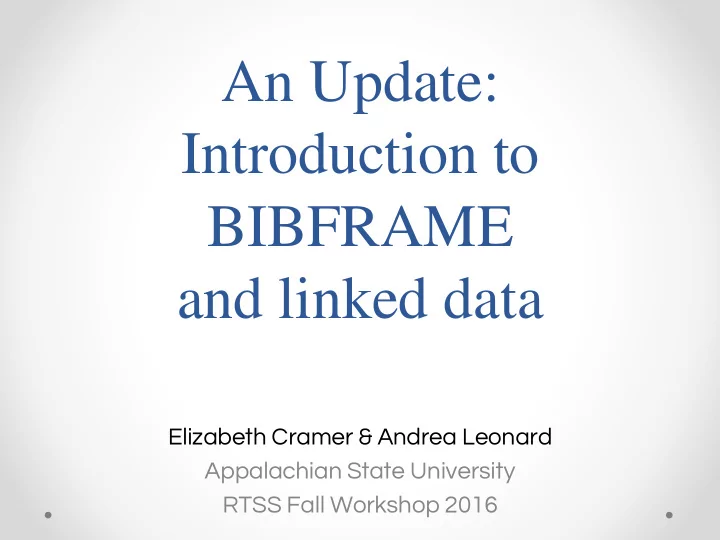

An Update: Introduction to BIBFRAME and linked data Elizabeth Cramer & Andrea Leonard Appalachian State University RTSS Fall Workshop 2016
Introduction Our motivation for this presentation: We were asked by RTSS leaders to do an update to the presentation on BIBFRAME and linked data we gave at NCLA 2015 We offered that 2015 presentation because we had questions and we wanted answers and we want to stay informed
BIBFRAME and linked data What is BIBFRAME? • What about MARC? What is linked data? What are the current challenges?
What is BIBFRAME? BIBFRAME is the bibliographic framework initiative headed by Library of Congress and Zepheira (a data management company) as an eventual replacement for MARC. BIBFRAME is created with the idea of allowing data to break free from the “document - like” environment of the MARC record and onto the web. BIBFRAME is built on web standards in order to connect library data with the data available on the web.
What about MARC? The MARC format severely limits what we can do with integrating bibliographic data into the web. • Not used outside of libraries • Inability to express relationships between resources and entities • Higher possible error rate for MARC data stored as static text within a catalog “silo”
MARC
BIBFRAME loc.gov http://id.loc.gov/authorities/names/n79021164
BIBFRAME Editor (2015)
BIBFRAME Editor (2016)
BIBFRAME Editor (2016)
What is linked data? Linked data is the framework behind the semantic web. Semantic web recognizes relationships between data. • Semantic framework: Subject -- Predicate -- Object • Example: Mark Twain -- Creator of -- Tom Sawyer These relationships are known as “triples.”
What is linked data? The web can recognize these relationships between data based on the foundation of the web specific standards XML and RDF (Resource Description Framework) RDF labels data and allows machines to recognize relationships between data Mark Twain wrote Tom Sawyer http://id.loc.gov/authorities/names/n79021164 http://purl.org/dc/terms/creator http://id.loc.gov/authorities/names/n79132704
The promise of linked data...
The future today
...available today.
Challenges • Legacy MARC records: Comparison Service and MARC to BIBFRAME Transformation Service • Changing skill sets for metadata librarians o But will we have to be programmers?! • Playing by the rules of the web • Vendor cooperation
Challenges How will our work as catalogers change? • BIBFLOW • LIBHUB • Linked Data for Libraries (LD4L) • Linked Data for Production (LD4P) • Linked Data for Libraries Labs
possible lingering questions... Wil ill we still have a catalog? When en will BIBFRAME replace MARC? When en will BIBFRAME standards and tools be ready?
Wi Will ll we still have a catalog? http://www.clipartpal.com/clipart_pd/education/schoollibrary1.html
Wi Will ll we still have a catalog? Today ay
2011 ...five years ago Stanford & Council on Library and Information Resources’ Report: “ Be part of the web - not just on it”
But will we still have catalogs? YES! Here’s Libhub example record (from 2015...evolving already)
When will BIBFRAME replace MARC? When will BIBFRAME standards and tools be ready? Oct 2015: in 5-7years? (Oct 2016: 4-6 years!?) It will be a phased process not a “flip of a switch”
Hang onto your hat! bluetooth, [location services capability beginning to be public…] 2000 2001 iPods 2002 Mozilla Firefox; Roy Tennant: MARC Must Die 2003 Skype 2004 Facebook 2005 Youtube 2006 Nintendo Wii 2007 iPhones, Kindles 2008 Android, Spotify, 4G broadband, Google Chrome browser, Library of Congress Working Group Report on Future of Bibliographic Control http://www.telegraph.co.uk/technology/2016/03/09/most-important-inventions-of-the-21st-century-in-pictures/ 2010 iPads, electric cars 2011 W3C Library Linked Data Incubator Group Final Report published 2012 Google driverless cars, Library of Congress releases BIBFRAME model
how about NOW? “Some libraries...wonder whether they should wait until BIBFRAME is “done” “Don’t wait - iterate!” - Eric Miller, Zepheira ( Pesch and Miller, 2016, p. 4)
Library.link Network http://library.link/
It’s happening NOW ! Denver Public Library
Worthington Public Library
Realistically, though What are next steps? join the library.link network? Wait until more libraries have gone before us…?
next steps? time me to s o shif ift t ou our fo focu cus It will take a new “business” model: both h technical cal and orga ganizat izational ional change ges. s. (Fons, 2016, p. 28)
Shifting Focus Consider search engines Start playing by the rules of the web (Fons, 2016, pp. 28-30)
Shifting Focus dir irect ct partne tnersh rships ips wit ith h search ch engine ines (Fons, 2016, pp. 29-30) • Knowledge graphs • Sponsored link programs
What is a knowledge card/panel/graph?
OverDrive and Microsoft’s Bing search engine
Shifting Focus “Play by the Rules” (Fons, 2016, pp. 29-30) • Local library knowledge and expertise in Semantic Web principles • Is your online presence web-friendly? • Catalog data quality standards, universal identifiers
A Resource for Catalogers We’ve created a LibGuide for you! BIB IBFRAME AME and Linked d Data: a: A Primer er fo for r Catalogers logers http://gu ://guide des. s.libra ibrary. ry.ap appstat pstate.e e.edu/bibframe du/bibframe
Questions and Discussion thank you for your interest and participation
Bibliography Baker, T., et al. (2011). W3C Incubator Group Report: Library Linked Data Incubator Group Final Report. Retrieved from https://www.w3.org/2005/Incubator/lld/XGR-lld-20111025/ Enis, M. (2016). Library.Link Builds Web Visibility: Platform Enables Search Engines to Highlight Catalogs, Library Journal , (13), 18-19. Fons, T. (2016). Improving Web Visibility: Into the Hands of Readers, ALA TechSource , 52:5. Retrieved from https://journals.ala.org/ltr/issue/view/555 Frick, R. (2011). Literature Survey in support of Stanford Linked Data Workshop, final report. Retrieved from https://www.clir.org/pubs/reports/pub152/linked-data-survey Pesch, O. and E. Miller. (2016). Using BIBFRAME and Library Linked Data to Solve Real Problems: An Interview with Eric Miller of Zepheira, The Serials Librarian , 71:1, 1-8, DOI:http://dx.doi.org/10.1080/0361526X.2016.1183159 Report of the Library of Congress Working Group on the Future of Bibliographic Control. (2008). URL: https://www.loc.gov/bibliographic-future/news/lcwg-ontherecord-jan08-final.pdf Tennant, R. (2002). MARC Must Die. Library Journal , 127 (17), 26-28.
Recommend
More recommend